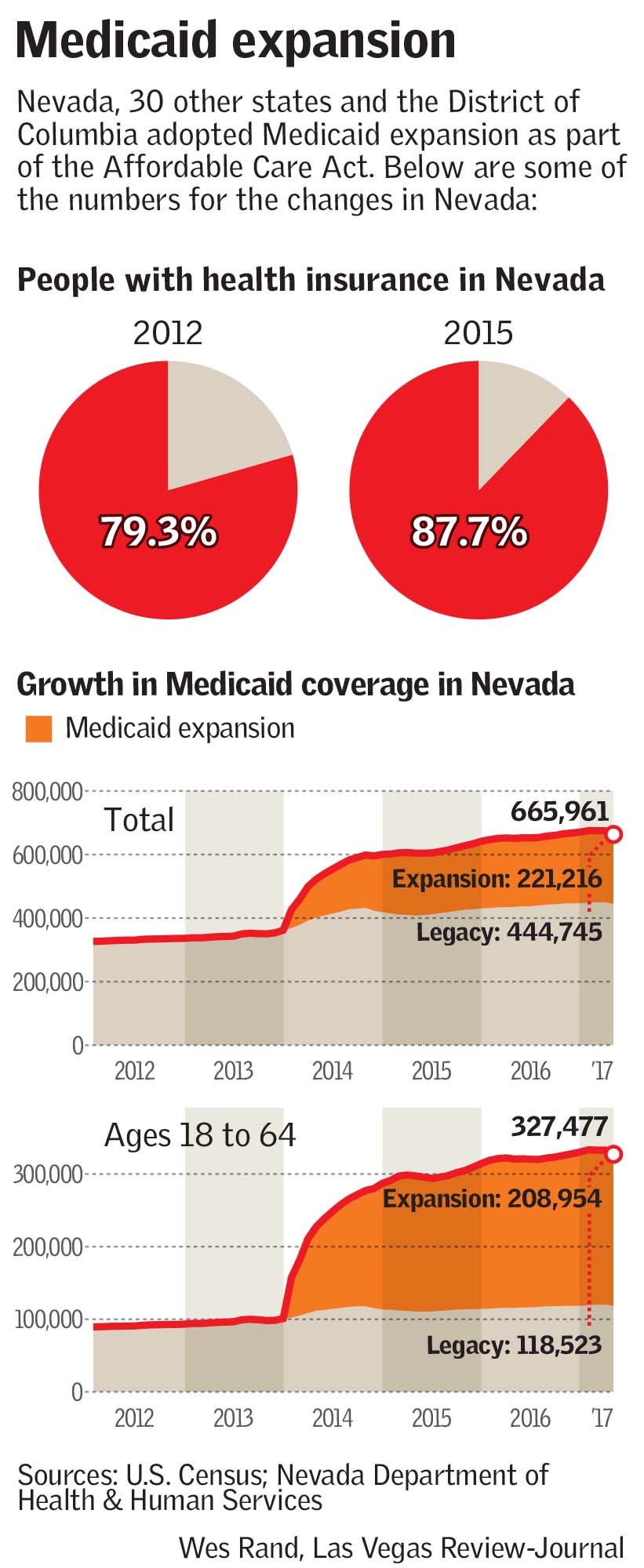Heller talks of effort to spare Nevadans from deep Medicaid cuts
WASHINGTON — Nevada’s Republican Sen. Dean Heller distanced himself from President Donald Trump’s budget proposal on Wednesday, saying he is working with a bipartisan group to preserve Medicaid spending in states that expanded the program.
In his first interview on his behind-the-scenes role in helping craft the Senate’s version of legislation to supplant the Affordable Care Act, Heller acknowledged that he and his colleagues face a tough challenge fighting off the $800 billion in Medicaid cuts over 10 years included in Trump’s budget blueprint and the House health care bill approved on May 4.
“The question is how do you get to 51 votes,” Heller told the Review-Journal. “It’s not going to be easy.”
The quest to win over a majority of senators is high stakes for Heller. He is considered the most vulnerable Republican senator up for re-election next year and has faced heated criticism over Republican health care plans during recent town hall meetings in Nevada.
Heller is working with a bipartisan group of senators to write a health care bill that can pass in the Senate and be reconciled with the House legislation that passed last month with the support of Trump. 
The House bill, which would change Medicaid funding formulas used to reimburse states, would increase the number of uninsured Americans by 23 million people and provide $119 billion in budget savings by 2026, according to a “scoring” of the legislation released Wednesday by the nonpartisan Congressional Budget Office.
Little room for Republican maneuvering
Many Republican senators expressed reservations about the House bill, which, among other changes, would use block grants and per-capita formulas to reduce federal Medicaid reimbursements to the states.
But with a 52-48 majority, the GOP has little room to maneuver in crafting a bill that can pass.
Senate Majority Leader Mitch McConnell, R-Ky., has set up a working group of about 13 Republican lawmakers to write health care legislation that he hopes can pass by the August recess.
“We’re trying to come together on a way to move forward to repeal and replace Obamacare,” McConnell said.
Heller is part of another group made up of mostly moderate Republicans — including Sens. Susan Collins of Maine, Rob Portman of Ohio, Bill Cassidy of Louisiana and Shelley Moore Capito of West Virginia — that is working with Democrats to find solutions on Medicaid funding changes.
Under the ACA, 31 states, including Nevada, and the District of Columbia expanded Medicaid, which provided coverage for an additional 11 million people, including 221,000 in Nevada.
Senators from the states that expanded Medicaid have argued that any bill repealing the ACA should keep the federal funding formula intact, which is a 90 percent to 10 percent federal-state match after 2020.
Conservatives and lawmakers from states that did not expand Medicaid want the program rolled back to save $839 billion in costs over 10 years.
Bipartisan group seeks added leverage
The issue cuts across usual partisan fault lines, since both “red” and “blue” states availed themselves of the opportunity to increase health-care coverage for some of their poorest residents.
Sen. Joe Manchin, D-W.V., said that working to improve the health care bill is imperative for his state, where nearly 600,000 people are covered under Medicaid.
Manchin and Sen. Heidi Heitkamp, D-N.D., who both represent states that Trump won easily last year, are considered two of the most vulnerable Democrats on the ballot in 2018.
Although a majority of Senate Democrats oppose a repeal of ACA, their presence gives the bipartisan group that Heller is part of some leverage to try to modify the House bill.
“It’s all a great discussion,” said Heller, who favors Obamacare repeal. “We are all having conversations of how to help, not to blow up a reform package, but something that is reasonable to states like ours so it that is not a big hit on our budget.”
Those talks include the reimbursement formulas and the timeline for implementing any changes, he indicated.
The hit could be even worse in Nevada and the other two other states that expanded Medicaid and have legislatures that meet every two years — Montana and North Dakota. In Nevada, an immediate implementation of a new formula that reduces the reimbursement rate could mean a $250 million state budget shortfall annually, Heller said.
Sandoval, other governors lobbying
Nevada Gov. Brian Sandoval, a Republican and vice chairman of the National Governors Association, has lobbied the White House and Congress to maintain coverage for those who became eligible for Medicaid under the expansion.
Other Republican governors in states that expanded the program, like John Kasich of Ohio, Rick Snyder of Michigan and Asa Hutchinson of Arkansas, also are actively involved with Senate lawmakers writing the health-care reform bill.
Heller said he is in constant contact with Sandoval, sending along ideas and proposals developed by the bipartisan Senate group. He also indicated he could be a “no” vote on Senate health-care legislation if a palatable Medicaid solution can’t be reached.
If Republican governors don’t approve of formula changes, “then I am going to have a very difficult time voting for them,” Heller said.
Meanwhile, Senate conservatives argue the bill should go further with Medicaid cuts, rolling back the expansion and reducing current coverage to boost savings from $800 billion to $1.2 trillion over 10 years.
Sens. Ted Cruz, R-Texas, Mike Lee, R-Utah and Rand Paul, R-Ky., are among those who want to see cuts to the core Medicaid program, which provides health care for the poor elderly and children.
Although Senate Republican leaders said the president’s budget, which includes Medicaid cuts, is “dead on arrival,” the spending blueprint is largely seen as an endorsement of the House health-care plan, which is not popular with the public, according to recent polls.
Heller predicted the bill that emerges from the Senate will look similar to the House bill while including changes to some programs. He’s hoping that Medicaid is one of those.
Contact Gary Martin at 202-662-7390 or gmartin@reviewjournal.com. Follow @garymartindc on Twitter.
Medicaid issue crosses party lines
Thirteen states that currently have Republican governors have expanded Medicaid under the Affordable Care Act, according to the Brookings Institution, a Washington-based think tank.


















